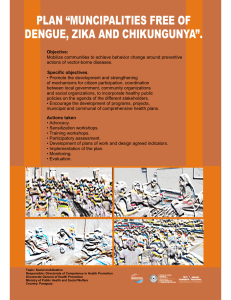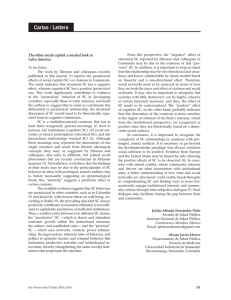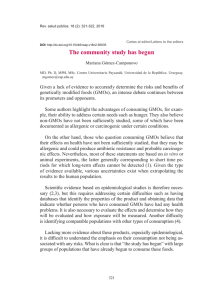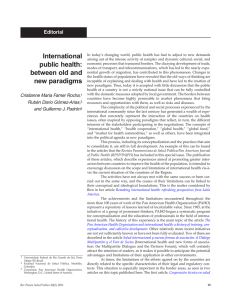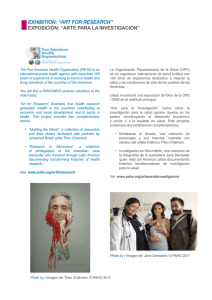Universal Health Coverage and its Conceptual
Anuncio
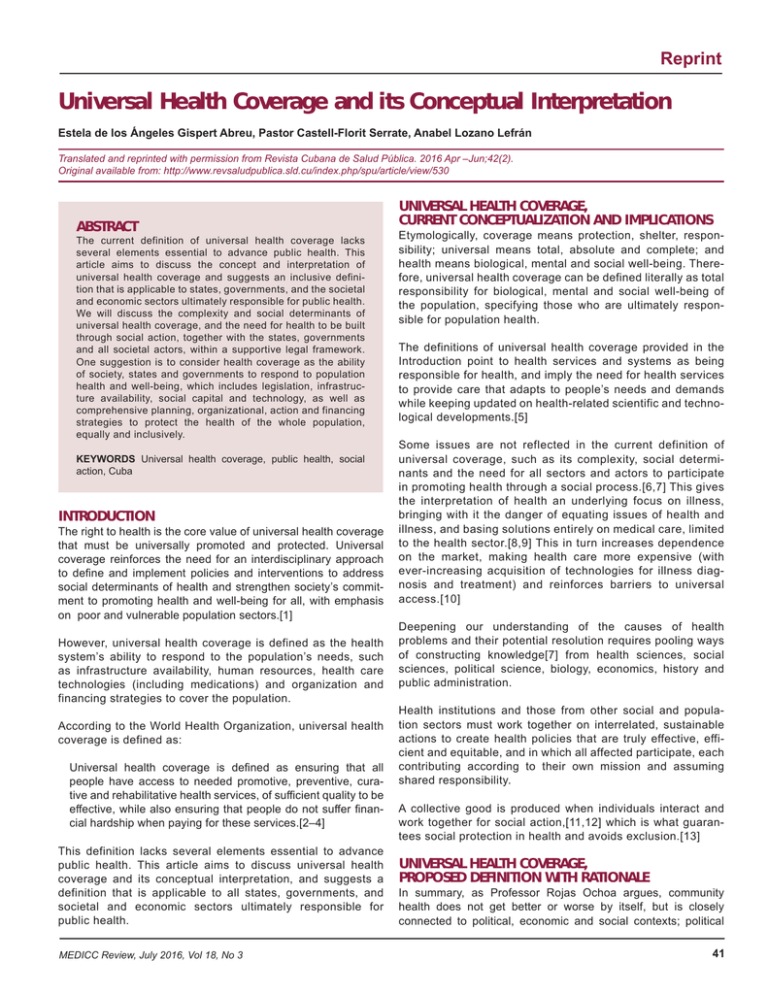
Reprint Universal Health Coverage and its Conceptual Interpretation Estela de los Ángeles Gispert Abreu, Pastor Castell-Florit Serrate, Anabel Lozano Lefrán Translated and reprinted with permission from Revista Cubana de Salud Pública. 2016 Apr –Jun;42(2). Original available from: http://www.revsaludpublica.sld.cu/index.php/spu/article/view/530 ABSTRACT The current definition of universal health coverage lacks several elements essential to advance public health. This article aims to discuss the concept and interpretation of universal health coverage and suggests an inclusive definition that is applicable to states, governments, and the societal and economic sectors ultimately responsible for public health. We will discuss the complexity and social determinants of universal health coverage, and the need for health to be built through social action, together with the states, governments and all societal actors, within a supportive legal framework. One suggestion is to consider health coverage as the ability of society, states and governments to respond to population health and well-being, which includes legislation, infrastructure availability, social capital and technology, as well as comprehensive planning, organizational, action and financing strategies to protect the health of the whole population, equally and inclusively. KEYWORDS Universal health coverage, public health, social action, Cuba INTRODUCTION The right to health is the core value of universal health coverage that must be universally promoted and protected. Universal coverage reinforces the need for an interdisciplinary approach to define and implement policies and interventions to address social determinants of health and strengthen society’s commitment to promoting health and well-being for all, with emphasis on poor and vulnerable population sectors.[1] However, universal health coverage is defined as the health system’s ability to respond to the population’s needs, such as infrastructure availability, human resources, health care technologies (including medications) and organization and financing strategies to cover the population. According to the World Health Organization, universal health coverage is defined as: Universal health coverage is defined as ensuring that all people have access to needed promotive, preventive, curative and rehabilitative health services, of sufficient quality to be effective, while also ensuring that people do not suffer financial hardship when paying for these services.[2–4] This definition lacks several elements essential to advance public health. This article aims to discuss universal health coverage and its conceptual interpretation, and suggests a definition that is applicable to all states, governments, and societal and economic sectors ultimately responsible for public health. MEDICC Review, July 2016, Vol 18, No 3 UNIVERSAL HEALTH COVERAGE, CURRENT CONCEPTUALIZATION AND IMPLICATIONS Etymologically, coverage means protection, shelter, responsibility; universal means total, absolute and complete; and health means biological, mental and social well-being. Therefore, universal health coverage can be defined literally as total responsibility for biological, mental and social well-being of the population, specifying those who are ultimately responsible for population health. The definitions of universal health coverage provided in the Introduction point to health services and systems as being responsible for health, and imply the need for health services to provide care that adapts to people’s needs and demands while keeping updated on health-related scientific and technological developments.[5] Some issues are not reflected in the current definition of universal coverage, such as its complexity, social determinants and the need for all sectors and actors to participate in promoting health through a social process.[6,7] This gives the interpretation of health an underlying focus on illness, bringing with it the danger of equating issues of health and illness, and basing solutions entirely on medical care, limited to the health sector.[8,9] This in turn increases dependence on the market, making health care more expensive (with ever-increasing acquisition of technologies for illness diagnosis and treatment) and reinforces barriers to universal access.[10] Deepening our understanding of the causes of health problems and their potential resolution requires pooling ways of constructing knowledge[7] from health sciences, social sciences, political science, biology, economics, history and public administration. Health institutions and those from other social and population sectors must work together on interrelated, sustainable actions to create health policies that are truly effective, efficient and equitable, and in which all affected participate, each contributing according to their own mission and assuming shared responsibility. A collective good is produced when individuals interact and work together for social action,[11,12] which is what guarantees social protection in health and avoids exclusion.[13] UNIVERSAL HEALTH COVERAGE, PROPOSED DEFINITION WITH RATIONALE In summary, as Professor Rojas Ochoa argues, community health does not get better or worse by itself, but is closely connected to political, economic and social contexts; political 41 Reprint will; education; development of art and literature; the power of social participation; interdisciplinarity; teamwork and above all, intersectoral cooperation. Strategies to promote health must be truly comprehensive.[14] One proposed definition for universal health coverage that includes states and governments together with all actors and sectors that make up society, could be: The ability of society, states and governments to respond to population health needs, through legislation, infrastructure availability, and social and technological capital, as well as comprehensive planning, organization, action and financing strategies to protect the health of the entire population, equitably and inclusively. Comprehensive health development requires, in addition to comprehensive and integrated social action, a supportive legal system that can process requests and complaints resulting from violations committed by different social bodies, organizations and institutions, to ensure the right to health. REFERENCES 1. 2. 3. 4. 5. 6. 7. 8. 42 Organización Panamericana de la Salud, Organización Mundial de la Salud. Estrategia para la cobertura universal de salud. Resolución CE154. R17. Washington, D. C.: OPS/OMS; 2014 [citado 16 Nov 2014]. Disponible en: http://www.paho.org/bra/images/stories/Documentos2/ce154-r17-s.pdf?ua=1 Organización Panamericana de la Salud, Organización Mundial de la Salud. Estrategia para el acceso universal a la salud y la cobertura universal de salud. Resolución CD53.R14. Washington, D. C.: OPS/OMS; 2014 [citado 11 Ener 2015]. Disponible en: http://www.paho.org/hq/index.php?option=com _docman&task=doc_download&gid=27597&Itemid=270&lang=es Organización Mundial de la Salud. Informe sobre la salud en el mundo 2008: la atención primaria de salud, más necesaria que nunca. Ginebra: OMS; 2008 [citado 14 Abr 2014]. Disponible en: http://www.who.int/whr/2008/08_report _es.pdf World Health Organization. World Health Report 2010. Health systems financing. Path to universal coverage. Geneva: WHO; 2010. Pan American Health Organization, World Health Organization. 53rd Directing Council. 66th Session of the Regional Committee of WHO for the Americas. Resolución CD53/R5, Rev. 2–ANNEX A. Strategy for universal access to health and universal health coverage. Washington, D. C.: PAHO/WHO; 2014. Ramis Andalia RM. Algunas reflexiones acerca de la noción de determinantes, determinantes sociales y desigualdades en salud. Infodir. 2012 [citado 30 Ener 2015];(15). Disponible en: http://bvs.sld.cu/revistas/infd/n1512/infd04212.htm Marleny Valencia A. Aportes de los nuevos enfoques para la conformación de la salud pública alternativa. Rev Fac Nac Salud Pública. 2011 [citado 30 Ener 2015];29(1):85-93. Disponible en: http://www.scielo.org.co/scielo .php?script=sci_arttext&pid=S0120-386X2011000100010&lng=en García González R. El enfoque social como elemento esencial del quehacer por la salud de la población. Rev Cubana de Salud Pública. 2011 [citado 3 Ener 2016];37(Supl):675-85. Disponible en: http://scielo.sld.cu/scielo .php?script=sci_arttext&pid=S0864-34662011000500015&lng=es 9. 10. 11. 12. 13. 14. Barros da Silva W. Reflexiones epistemológicas en las Ciencias de la salud. Rev Hum Med. 2008;8(3). Thielmann K, Illnait Ferrer J. La crisis y la salud. ¿La salud en crisis? Rev Cubana Salud Pública. 2012 [citado 30 Ener 2015];38(2). Disponible en: http:// www.revsaludpublica.sld.cu/index.php/spu/article/view/222/254 Duarte Nunes E. Por una epistemología de la Salud Colectiva: los conceptos sociológicos. Salud Colec. 2010 [citado 30 Ener 2015];6(1):11–9. Disponible en: http:// www.scielo.org.ar/scielo.php?script=sci_arttext&pid=S1851-8265201000010 0002&lng=es&nrm=iso Muñoz Muñoz S. Salud y desarrollo en el contexto Latinoamericano. Rev Cubana Salud Pública. 2011;37(2). Agost Felip MR, Martín Alfonso L. Acercamiento al papel de los procesos de exclusión social y su relación con la salud. Rev Cubana Salud Pública. 2012 [citado 30 Ener 2015];38(1). Disponible en: http://www.revsaludpublica.sld.cu/ index.php/spu/article/view/237/273 Rojas Ochoa F. Políticas sociales y salud de la población. Rev Cubana Salud Pública. 2011 [citado 3 Ener 2016];37(4). Disponible en: http://scielo.sld.cu/ scielo.php?script=sci_arttext&pid=S0864-34662011000400001&lng=es THE AUTHORS Estela de los Ángeles Gispert Abreu ([email protected]), National School of Public Health, Havana, Cuba. Pastor Castell-Florit Serrate, Director, National School of Public Health, Havana, Cuba. Anabel Lozano Lefrán, National School of Public Health, Havana, Cuba. MEDICC Review, July 2016, Vol 18, No 3

